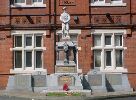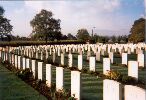
Newton-le-Willows and
Earlestown War Memorial

| OTHER WARS |
 |
Newton-le-Willows andEarlestown War Memorial |
 |
| The
Great War Roll of Honour |
|||||||||||||||||||||||||
Rifleman Leo Doyle was the son of Mr and Mrs Frank Doyle of
Newton-le-Willows. He served his time with Messrs. McCorquodale and Co. as
a compositor, but then emigrated to Chicago. On the outbreak of war, he immediately
returned and enlisted, doing so in St. Helens. He went out to France in 1915.
In a letter he gives an account
of the journey.
The first indication that there was anything wrong came in a letter from Rev.
Fr. J. Crotty, R.C. Chaplain with the Forces, who had been stationed at St.
Mary's, Newton, for a lengthy time. The "Newton and Earlestown Guardian"
of August 18th 1916 reproduced the letter, which it suggested "was sent
prompted by the kindly feeling that it would prepare the way for more serious
news" as the letter clearly implied that the injuries were to Leo's hands
and were "nothing very serious."
However, very shortly afterwards Leo's parents received a telegram followed
by an official paper stating that their son had died in the South African
Hospital, Abbeville, on August 12th from wounds received in action.
Leo Doyle is buried in the Abbeville
Communal Cemetery (Plot VI Row D Grave 9), Abberville being a town about
80 km south of Boulogne, on the main road from Boulogne to Paris (N1). Three
hospitals were stationed there between 1915 and 1919.
Fr. Crotty's original letter was dated August 9th. In his book "Ich Dien",
Captain Whalley-Kelly gives an account of the Attack on Guillemont, on the
8th and 9th August 1916, the action in which Leo probably sustained his fatal
injuries and part of the Battles of the Somme. Captain
Carlton Collingwood and Private Percy Foden
were killed while supporting the action.
"On 8th August the 55th Division was ordered to capture the village of
Guillemont, a
tactical locality of great importance… For the first stage of this operation
the 166th Infantry Brigade, to which the Battalion belonged, was in reserve
in bivouacs near the Citadel.
"At 4.20 a.m. on the 8th the attack commenced, the first waves capturing
all their objectives with great dash…. At 5 p.m. the 166th Infantry
Brigade was warned to be in readiness to continue the attack on the following
morning, and at midnight operation orders were received confirming this.
"The Brigade orders laid down that Guillemont
village was to be the final objective, and that the attack would be made on
a two-battalion front, the Liverpool Scottish on the right and the 5th Loyals
on the left; the 5th Battalion was to support the 5th Loyals. The assault
was timed to commence at 4.20 a.m. and there was to be no preliminary bombardment.
"Shortly after 2 a.m. on the 9th, Battalion Headquarters moved forward
to a sunken road near the assembly positions… Owing to the late hour
at which orders were received, there had been no time or opportunity for reconnaissance
and, in consequence, none of the battalion or company commanders had much
idea of the lie of the land. In addition, the sunken road was crowded with
troops of the 164th Infantry Brigade, who had attacked the previous day, and,
as a result, there was considerable delay in getting the companies of the
5th Battalion into their proper positions… However, at zero our guns
opened with great violence, but within three minutes the enemy's answering
barrage came down, mainly on the sunken road, thus making confusion worse
confounded, and cutting off those elements that had not already reached their
starting-line.
"Nevertheless, a gallant attempt was made to reach the German trenches,
an attempt which broke down under withering machinegun fire, the whole line
coming back to the localities captured on the previous day. By this time the
companies of the 5th Battalion were hopelessly mixed up with those of the
two units in the leading wave, and it was noon before they could be reorganised."